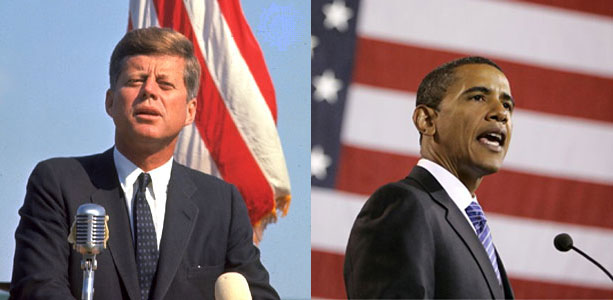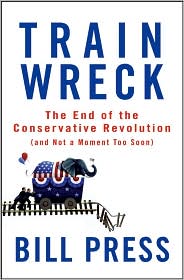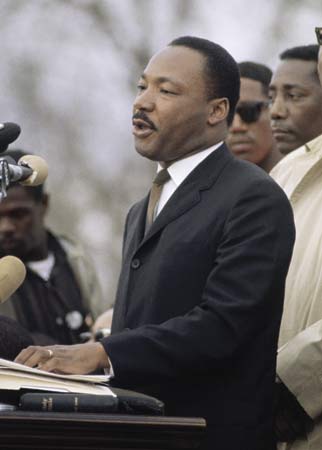Another personal plug: As part of the online rollout for a new edition of Walter LaFeber’s The American Century, I recently composed four brief classroom essays on various 20th century events, as evaluated from a 21st century (re: ruthlessly presentist) perspective. In case anyone’s interested, they’ve now gone live: The Versailles Conference | The Military Industrial Complex Speech | The Tet Offensive | A Second American Century? Now, that’s edutainment.
Tag: The Sixties
To the Promised Land.

“‘The world is a tough place,’ he said with a chuckle. ‘You’re never going to get out of it alive.‘” A damn dirty ape no longer, Charlton Heston, 1923-2008. (Between this and Buckley, it’s been a bad year so far for the patriarchs of conservatism.)
Update: Hmmm. After reading up on him further, it seems Heston (nee John Carter!) was a late-comer to the conservative movement, and even to the NRA philosophy: “In his earlier years, Heston was a liberal Democrat, campaigning for Presidential candidates Adlai Stevenson in 1956 and John F. Kennedy in 1960. A civil rights activist, he accompanied Martin Luther King Jr. during the civil rights march held in Washington, D.C. in 1963…In 1968, following the assassination of Senator Robert F. Kennedy, Heston…called for public support for President Johnson’s Gun Control Act of 1968…He was also an opponent of McCarthyism and racial segregation, which he saw as only helping the cause of Communism worldwide. He opposed the Vietnam War and considered Richard Nixon a disaster for America. He turned down John Wayne’s offer of a role in The Alamo, because the film was a right-wing allegory for the Cold War.“
End of an Era.
A personal plug: Also out in stores this week, my fourth collaboration with Democratic pundit Bill Press (1, 2, 3): Trainwreck: The End of the Conservative Revolution (and not a moment too soon). If you couldn’t guess from the title, it basically argues that, just as the New Deal era lasted from 1932-1968, the Age of Conservatism that began in ’64 with Goldwater, hit its stride in the 70’s and 80’s, and gave us the likes of Reagan, Gingrich, and, of course, Dubya, has now hit the proverbial, inevitable, historical brick wall. So let’s survey the wreckage: On one hand, from Katrina to Abramoff and Ed Meese to Alberto Gonzales, right-wing attempts at governance over the past thirty years have usually degenerated into dismal experiments in cronyism and/or incompetence. On the other, conservatism has strayed so far from its ideological roots in the Reagan and particularly Dubya eras that the likes of Robert Taft, Russell Kirk, and William F. Buckley would never even recognize it. (Case in point, the Ron Paul candidacy, wherein a traditional Taft conservative ended up being treated by his esteemed Republican contemporaries in every debate as either a fringe joke or a terrorist-sympathizing dupe.) Either way, the right-wing ascendancy is over, and it’s our time again now (and, though it’s not reflected in this tome, I think y’all know who I’d prefer to be carrying our progressive standard into battle in 2009 and beyond…)
Hayden: The Kids are Alright.
“[T]oday I see across the generational divide the spirit, excitement, energy and creativity of a new generation bidding to displace the old ways. Obama’s moment is their moment, and I pray that they succeed without the sufferings and betrayals my generation went through. There really is no comparison between the Obama generation and those who would come to power with Hillary Clinton, and I suspect she knows it. The people she would take into her administration may have been reformers and idealists in their youth, but they seem to seek now a return to their establishment positions of power. They are the sorts of people young Hillary Clinton herself would have scorned at Wellesley. If history is any guide, the new ‘best and brightest’ of the Obama generation will unleash a new cycle of activism, reform and fresh thinking before they follow pragmatism to its dead end.”
In The Nation, SDS co-founder, author of the Port Huron Statement, and longtime progressive Tom Hayden endorses Barack Obama for president. “Barack Obama is giving voice and space to an awakening beyond his wildest expectations, a social force that may lead him far beyond his modest policy agenda. Such movements in the past led the Kennedys and Franklin Roosevelt to achievements they never contemplated. [As Gandhi once said of India’s liberation movement, ‘There go my people. I must follow them, for I am their leader.’] We are in a precious moment where caution must yield to courage. It is better to fail at the quest for greatness than to accept our planet’s future as only a reliving of the past. ”
“A President, Like My Father.”

“I want a president who understands that his responsibility is to articulate a vision and encourage others to achieve it; who holds himself, and those around him, to the highest ethical standards; who appeals to the hopes of those who still believe in the American Dream, and those around the world who still believe in the American ideal; and who can lift our spirits, and make us believe again that our country needs every one of us to get involved.”
In a moving editorial, Caroline Kennedy endorses Barack Obama for president. “I have never had a president who inspired me the way people tell me that my father inspired them. But for the first time, I believe I have found the man who could be that president — not just for me, but for a new generation of Americans.”
Meet Us in St. Louis.
“Thus did Barack Obama, in his campaign book ‘The Audacity of Hope,’ touch on a fundamental problem in today’s American politics: It’s too much about yesterday’s American politics. In too many ways, it’s still about Vietnam. It’s still about hardhats and hippies. It’s about Watergate and Iran-contra and Whitewater. It’s about the past. Barack Obama is aware of yesterday, but he is about today and tomorrow and next year. In a strong field of Democratic presidential contenders, he offers the best hope of transforming the debate and moving on to what America can be in the 21st century.“
The St. Louis Post-Dispatch endorses Barack Obama for president. “Comets don’t come around that often. In January of 1961, Ann Dunham Obama was six weeks pregnant with Barack Obama Sr.’s child when President Kennedy said at his inauguration that ‘the torch has been passed to a new generation.’ It’s that time again.”
MLK 2K8.
The Great Need of the Hour.
|
We are told that those who differ from us on a few things are different from us on all things; that our problems are the fault of those who don’t think like us or look like us or come from where we do. The welfare queen is taking our tax money. The immigrant is taking our jobs. The believer condemns the non-believer as immoral, and the non-believer chides the believer as intolerant.
For most of this country’s history, we in the African-American community have been at the receiving end of man’s inhumanity to man. And all of us understand intimately the insidious role that race still sometimes plays – on the job, in the schools, in our health care system, and in our criminal justice system. And yet, if we are honest with ourselves, we must admit that none of our hands are entirely clean. If we’re honest with ourselves, we’ll acknowledge that our own community has not always been true to King’s vision of a beloved community. We have scorned our gay brothers and sisters instead of embracing them. The scourge of anti-Semitism has, at times, revealed itself in our community. For too long, some of us have seen immigrants as competitors for jobs instead of companions in the fight for opportunity. Every day, our politics fuels and exploits this kind of division across all races and regions; across gender and party. It is played out on television. It is sensationalized by the media. And last week, it even crept into the campaign for President, with charges and counter-charges that served to obscure the issues instead of illuminating the critical choices we face as a nation. So let us say that on this day of all days, each of us carries with us the task of changing our hearts and minds. The division, the stereotypes, the scape-goating, the ease with which we blame our plight on others – all of this distracts us from the common challenges we face – war and poverty; injustice and inequality. We can no longer afford to build ourselves up by tearing someone else down. We can no longer afford to traffic in lies or fear or hate. It is the poison that we must purge from our politics; the wall that we must tear down before the hour grows too late. Because if Dr. King could love his jailor; if he could call on the faithful who once sat where you do to forgive those who set dogs and fire hoses upon them, then surely we can look past what divides us in our time, and bind up our wounds, and erase the empathy deficit that exists in our hearts… The Scripture tells us that we are judged not just by word, but by deed. And if we are to truly bring about the unity that is so crucial in this time, we must find it within ourselves to act on what we know; to understand that living up to this country’s ideals and its possibilities will require great effort and resources; sacrifice and stamina. And that is what is at stake in the great political debate we are having today. The changes that are needed are not just a matter of tinkering at the edges, and they will not come if politicians simply tell us what we want to hear. All of us will be called upon to make some sacrifice. None of us will be exempt from responsibility. We will have to fight to fix our schools, but we will also have to challenge ourselves to be better parents. We will have to confront the biases in our criminal justice system, but we will also have to acknowledge the deep-seated violence that still resides in our own communities and marshal the will to break its grip. That is how we will bring about the change we seek. That is how Dr. King led this country through the wilderness. He did it with words – words that he spoke not just to the children of slaves, but the children of slave owners. Words that inspired not just black but also white; not just the Christian but the Jew; not just the Southerner but also the Northerner. He led with words, but he also led with deeds. He also led by example. He led by marching and going to jail and suffering threats and being away from his family. He led by taking a stand against a war, knowing full well that it would diminish his popularity. He led by challenging our economic structures, understanding that it would cause discomfort. Dr. King understood that unity cannot be won on the cheap; that we would have to earn it through great effort and determination. That is the unity – the hard-earned unity – that we need right now. It is that effort, and that determination, that can transform blind optimism into hope – the hope to imagine, and work for, and fight for what seemed impossible before. |
Excerpted from Sen. Barack Obama’s speech at Ebenezer Baptist Church yesterday. Worth reading in its entirety. Update: Or watch it here.
Update: John Nichols of The Nation gushes: “This is the speech Obama has needed to deliver. This is the speech America has been waiting for since that awful and glorious spring of 1968. Barack Obama has found the language for a politics that transforms rather than merely transitions. He should not retreat from the mountaintop. He should hold the rhetorical ground he has finally captured, and call us to join him upon it.” Hear, hear.
Permission to Come Aboard.
“Since the birth of our nation change has been won by young presidents and young leaders who have shown that experience is not defined by time in Washington and years in office. It is defined by wisdom and instinct and vision…The only charge that rings false is the one that tells you not to hope for a better America. Don’t let anyone tell you to accept the downsizing of the American dream.” Barack Obama picks up a few more endorsements in Sen. John Kerry (and more importantly, his voter list and organization), South Dakota Senators Tim Johnson and Tom Daschle, and Congressman George Miller (which some see as a nod from Speaker Pelosi, although Pelosi clarified again today that she plans not to endorse anyone.) In the meantime, while a new poll has Obama up 12 in South Carolina (not that polls mean much anymore, of course), South Carolina’s leading Democrat (and my old congressman) Jim Clyburn still hasn’t officially picked his candidate. “Clyburn, continuing to be coy about his endorsement, often tells reporters that he’s made up his mind, but never offers a name. Most signs, though, point to Obama.”
Update: “To call that dream [of an Obama presidency] a fairy tale, which Bill Clinton seemed to be doing, could very well be insulting to some of us.” No official word yet, but Clyburn suggests again he’s leaning Obama now, in part because of the Clintons’ dismaying behavior in New Hampshire. Speaking of Senator Clinton’s enthronement of LBJ as the civil rights ideal: “‘We have to be very, very careful about how we speak about that era in American politics,’ said Mr. Clyburn, who was shaped by his searing experiences as a youth in the segregated South and his own activism in those days. ‘It is one thing to run a campaign and be respectful of everyone’s motives and actions, and it is something else to denigrate those. That bothered me a great deal.‘”
Update 2: I posted more about Clyburn’s remarks — and Clinton’s view of history — here.
“False Hopes” before the Jury of History.
“‘What does that mean, false hopes?’ he said at Claremont, the start of a 720-word summation about ‘false hope’ he repeated almost word for word during the day. ‘How have we made progress in this country? Look, did John F. Kennedy look at the moon and say, ‘Ah, it’s too far?’ We can’t do that. We need a reality check. Dr. King standing on the steps of the Lincoln Memorial. ‘You know, this dream thing, it’s a false hope. We can’t expect equality.’ ‘False hopes. Let me tell you something about hope. I do talk about hope quite a bit. Out of necessity. There is no oddsmaker who would have said that I would be standing here when I was born in 1961.’” Invoking JFK and MLK, Obama turns Clinton’s dismaying “false hopes” barb into campaign music. (And, hey, Al Smith is in there too: “We are happy warriors for change,” Obama cried at a rally in Lebanon.“)
For her part, Senator Clinton also went to the historical analogy well of late and came back with…Lyndon Johnson? “‘Dr. King’s dream began to be realized when President Johnson passed the Civil Rights Act,’ Clinton said. ‘It took a president to get it done.’” (One of her introducers took it all a bit far and brought up Kennedy’s murder: “‘Some people compare one of the other candidates to John F. Kennedy. But he was assassinated. And Lyndon Baines Johnson was the one who actually’ passed the civil rights legislation.” As my sister-in-law Lotta also noted recently, Not Cool.) At any rate, Clinton’s factual grasp of history is basically sound, if dismayingly top-heavy. In the inspiration department, however, LBJ probably isn’t going to get it done.


